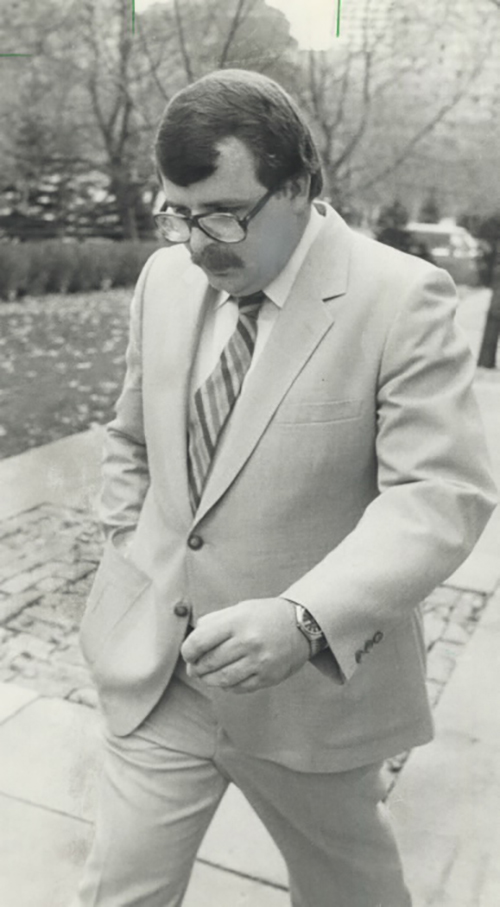By Chuck Darrow
A fascinating—if, at this point, nearly forgotten—story of Atlantic City’s legal-gaming era is that of Brian Molony, who, in the early 1980s, became the only gambler to cause a casino to cease operations.
On the surface, Molony, a Toronto, Canada resident who was born in 1955, appeared to be the last person one would suspect to be at the center of a scandal that rocked both New Jersey’s gaming and Canadian banking industries. By all accounts, there was absolutely nothing extraordinary or noteworthy about him in appearance or behavior. He drove an old, beat-up car, wore the kind of clothes you might find at K-Mart back then and lived with his girlfriend in a one-bedroom apartment in a far-from-glamorous part of Toronto known as Hogtown.
From published descriptions (and the portrayal of him by the late Philip Seymour Hoffman in the excellent, low-budget 2003 indie film, “Owning Mahowny), words like “nondescript,” and “milquetoast” perfectly describe him.
Professionally, he was just as unremarkable, a nameless, faceless cog in the huge machine that was the Canadian Imperial Bank of Commerce, a staid, old-line financial institution that was a pillar of that country’s financial world. But he suffered from a disease that ultimately wreaked havoc from CIBC’s headquarters to what was then called Caesars Boardwalk Regency (now Caesars Atlantic City): Compulsive gambling.

Credit: Michael Stuparyk, Getty Images
It’s one thing when fabulously wealthy individuals gamble away millions at their favorite casinos. But as a CIBC employee, Molony was making only about 10,000 Canadian dollars a year—which didn’t keep him from reportedly losing more than $10 million at various casinos, primarily the Regency.
According to a 2017 article in the Toronto Star, Molony devised a system of embezzling funds from his employer that had him creating phony people and companies to whom he would make loans on behalf of CIBC. He would also cook the bank’s books in order to make it look as if the make-believe borrowers were actually repaying the loans in a timely fashion.
Per the Star, during a 15-month stretch in the early 1980s, Molony gambled at Caesars 37 times. At first, he flew commercially to Atlantic City, carrying with him hundreds of thousands in cash. In a 1984 jailhouse interview with Star reporter David Miller, Molony related how he was so “stuffed” with $350,000 on his person that he could “hardly sit down.”
As Molony told Miller, Molony’s car keys triggered an airport-security alarm, “but the money is stuffed on top of the keys and I couldn’t reach them…I’m sweating buckets.” But he somehow managed to get them out of his pocket and continue his trip unmolested.
The episode spooked Molony enough for him to reconsider his actions. However, Casears officials had a “fish” on the line—even better, one who shunned the perks of high-rollerdom like lavish suites, premium show tickets, expensive meals and even the services of prostitutes—and they weren’t going to cut the line and let him get away. So they and Molony devised a system of cash transfers that involved drafts drawn on other banks with funds transferred to the casino. In addition, Caesars began flying him to Atlantic City on private jets, in order for him to avoid possible detection in public security lines.
Hitting the gaming tables at Caesars wasn’t Molony’s only source of gambling activity. He was also an inveterate sports bettor, and that was how his name ultimately came to the attention of Canadian authorities investigating his bookies. That initiated their scrutiny of Molony and—more to the point—the source of his gambling funds. He was ultimately arrested on April 27, 1982, and subsequently tried and convicted for embezzlement. He spent six years in prison for his crimes.
But Molony couldn’t have pulled off his scams without the assistance of the Caesars execs who never questioned the source of his money. According to a contemporaneous New York Times article, the state of New Jersey penalized the casino for “violating credit, deposit and reporting regulations.” As a result, Caesars was ordered to completely shut down its casino operation for 24 hours—which it’s been estimated, may have cost it as much as $800,000 in lost revenue.
The casino stayed closed on November 30, 1985, which employees mockingly dubbed “Brian Molony Day.”
According to various reports, since his release from prison, Molony has worked as a “business consultant” and has also lectured on compulsive gambling.
Remembering When is a monthly column that looks at Atlantic City’s often-wild, always-fascinating history.
Chuck Darrow has spent more than 40 years writing about Atlantic City casinos.










